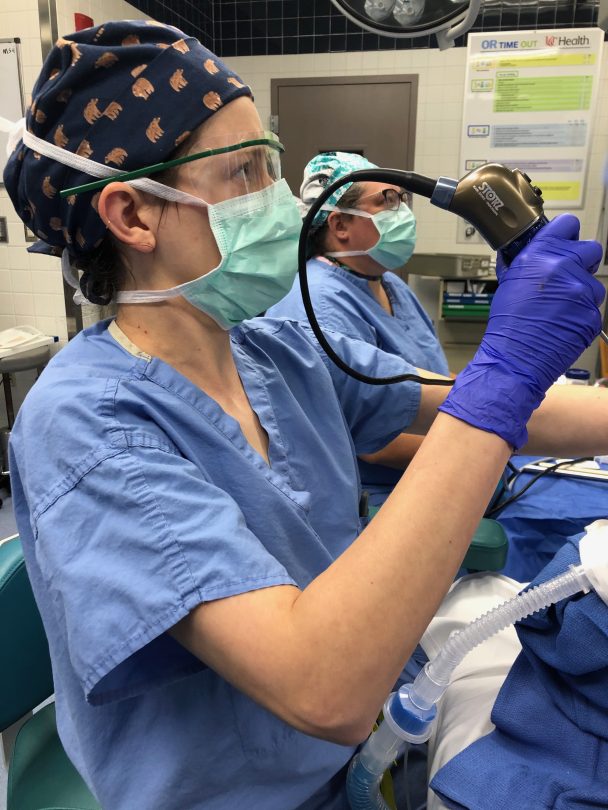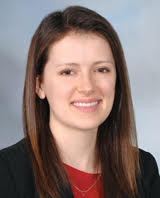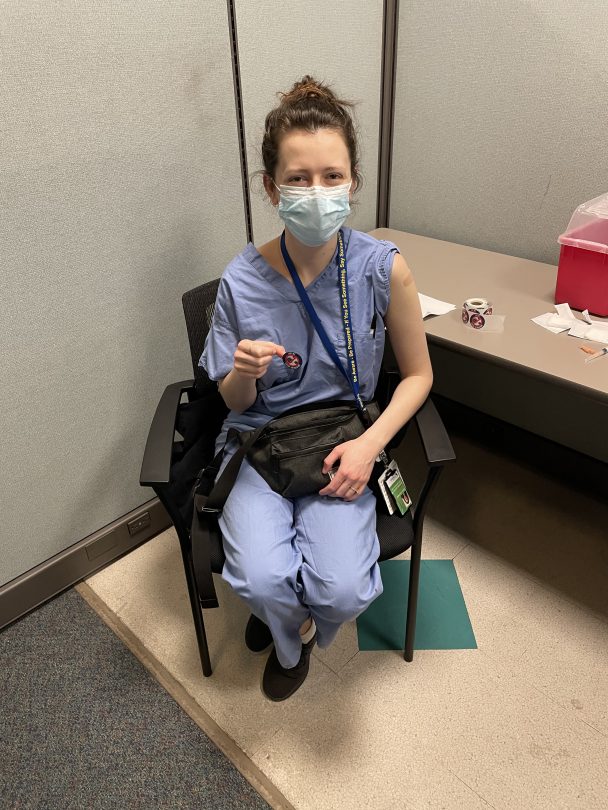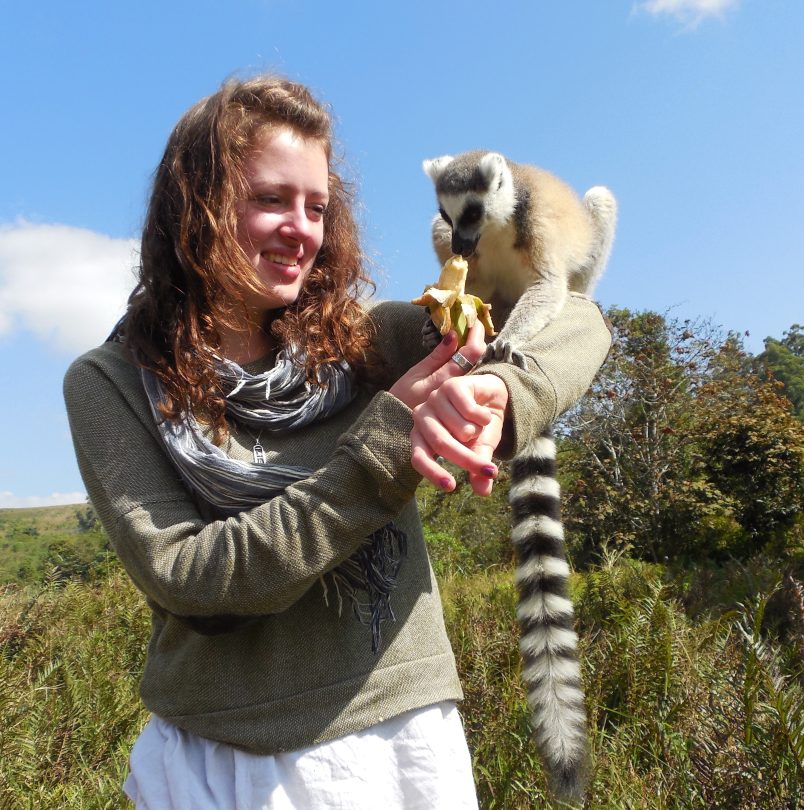
Consider the demands of becoming a surgeon specializing in otolaryngology (ear, nose and throat): the intellectual rigor; the artistry to reconstruct parts of the human body so integral to experiencing the world; and the physical and emotional stamina required to complete the grueling days that begin before dawn and unfold alongside the lives and needs of people from every walk of life.
Raisa Tikhtman ’14, who grew up in Lexington, Kentucky, is in her second year as a resident physician in Cincinnati. She can’t imagine a better foundation for her medical career than her multifaceted liberal arts education at Transylvania University, including a dual major in French and biochemistry.
“I think there’s a common misconception that you have to get a bachelor’s in science or have a mostly science-focused undergraduate experience in order to be a viable candidate for medical school and a strong medical student once you’re there,” Tikhtman says. “I would argue that’s a very narrow way to approach the field of medicine. It’s so much more dynamic. It’s a field that encompasses all aspects of the human experience.” What better preparation than a rigorous exploration of humanities and science?
Out of the vast discipline of medicine, Tikhtman says she chose otolaryngology because it offers the opportunity to work with people of all ages and at all levels of medical complexity. She decided to specialize in surgery because of the creativity it offers and the opportunity to work with her hands.

“The reconstructive side of ENT [ear, nose and throat] is very unique,” she says. No patient is the same. “There’s this aspect of critical thinking that’s different than if you’re not in a surgical field, which I find fascinating, and hopefully will be able to do it well one day.” When asked to describe how the critical thinking works in surgery, she explains being in that moment:
“You have an anatomic issue you have to approach, and you have to think about it from a mechanistic standpoint (how their body will work once you’ve done what you do). You have to think about it from a visual standpoint, particularly when you’re doing surgery that affects somebody’s face and neck and their mouth and the things that other people see, and will be how the patients present themselves to the world. You have to think of it, depending on the problem you’re dealing with, from a management standpoint — so you approach a cancer surgery different from another surgery. So all of those things feed into the ultimate decision-making that you do when a patient is asleep on the table in the operating room. So it’s not formulaic. There are algorithms we follow in treatment guidelines, but you can’t think every patient is the same because they’re definitely not.”
Tikhtman reveals how it’s not only the challenge of this specialization, but also the sense of purpose and the relationship with her patients that drive and energize her.

“Every day is different,” Tikhtman says of her residency that takes her from surgeries to clinics, hospital rounds to lectures, and basic cases to critical care. She describes a recent sampling of rotations through the head and neck cancer service and the voice clinic, along with care for critically ill COVID-19 patients requiring tracheostomies for long-term ventilation. Each challenge requires particular knowledge, skills and levels of human understanding. In the laryngology clinic a singer struggling with a voice disorder is diagnosed as having vocal cord paralysis and is treated. A patient with hearing loss receives surgical and medical help.
Other patients are dealing with life and death situations, some of them chronic. Tikhtman describes a recent patient with neck cancer who, after receiving life-altering surgery, is being helped to learn a new way to speak. “Figuring out how to help patients readjust to the world after the surgery is certainly part of our role as the surgical team. I find that really, really rewarding.”
Being responsive and able to function and communicate on so many levels is crucial to her work. Tikhtman sees an “absolute” link between her abilities and Transy, where “the goal is to foster an open-mindedness and a flexibility in your ability to perceive and approach different problems.” She points to the effectiveness of taking science-focused courses, language courses and more of the humanities — and seeing the results.
“The Transy experience prepares you to approach problems from many perspectives,” she explains. And the intimate learning environment makes certain that all students verbally articulate their thinking. There’s no hiding in the back of the room.
“Developing that ability to articulate my thoughts and defend them, as well as to be an effective writer, are critical to my career in medicine,” Tikhtman says. She feels their relevance every day in how she is “able to speak to patients at a level that’s appropriate for their understanding and at the same time communicate with other medical providers effectively,” she explains, “and then to be able to express myself through writing, through medical documentation, through research and everything else.”

Tikhtman sees all of this as “the product of having a very, very strong undergraduate foundation.” It’s difficult to imagine thriving as a physician without it. “One doesn’t know how critical effective communication is as a medical provider until you’re in it,” she notes. “I’m always like, wow, if I didn’t have this ability to speak to people, this would be so much harder.”
People are drawn to the medical profession for different reasons, Tikhtman reflects. For her, it’s the human interaction. She enjoys and derives true purpose from stepping in to support them when they are at their most vulnerable.
“I love talking to people. I love trying to be a source of comfort in a time of need. It’s obviously very challenging at times, but I think it’s a worthwhile challenge,” she says, “and certainly you feel like you’ve done a world of good when you are successful. It’s the feeling that you are making an impact for this individual in what seems to be a profound way — if you’re able to be effective as part of that care team at that moment in their life.”
Once Tikhtman finishes her five-year residency, she will likely specialize further in a one- to two-year fellowship, possibly in head and neck cancer or pediatrics.
Eventually, she’d like to be part of the academic world as well as a practicing surgeon. She values the lively, ever-changing environment of new learners circulating in and out, and the variety of human interaction. Even now, when offering advice to prospective pre-med students, she emphasizes the reasons for and the importance of pursuing an expansive grounding in the liberal arts.
“You have to have a very broad understanding of the world to be able to be an effective provider for patients of all different backgrounds,” she tells them, but also in order to navigate “a field that is affected by politics and the economy and everything else.
“I always reflect on my dual background and how I would never take away that humanities focus that I had at Transy.” If there is one regret, she muses, it’s that “in retrospect, I wish I had been able to take more classes that were not in the science field — like economics. I think all of those things would have been applicable in some way to this career.”
See also: Transylvania graduate receives top national leadership honor from Omicron Delta Kappa

